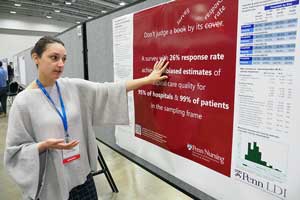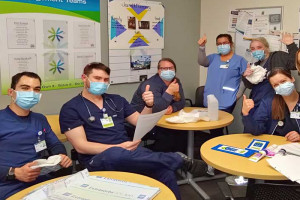Established in 1989 as one of the first centers to scale up rigorous research on the impact of nursing on patient outcomes, the Center uses evidence to inform policy and produces the next generation of scientists.
![[Left] Dr. Eileen Lake, Professor and Associate Director of the Center for Health Outcomes and Po...](/live/image/gid/58/width/800/height/175/14556_nurse4all-web-story-header.rev.1697726355.jpg) [Left] Dr. Eileen Lake, Professor and Associate Director of the Center for Health Outcomes and Policy Research (CHOPR), presents study findings on disparities in hospital nurse outcomes during COVID-19. [Center] Dr. Matthew D. McHugh, Professor and Director of CHOPR shares findings from CHOPR's pioneering investigation on health equity and patient outcomes. [Right] Dr. Margo Brooks Carthon, Associate Director of CHOPR addresses the disproportionate risk borne by low income individuals with multiple chronic conditions who are transitioning to home from acute care settings. Credit: Hoag LevinsNurses4All Initiative at University of Pennsylvania Drives Evidence-Based Change in Nursing
[Left] Dr. Eileen Lake, Professor and Associate Director of the Center for Health Outcomes and Policy Research (CHOPR), presents study findings on disparities in hospital nurse outcomes during COVID-19. [Center] Dr. Matthew D. McHugh, Professor and Director of CHOPR shares findings from CHOPR's pioneering investigation on health equity and patient outcomes. [Right] Dr. Margo Brooks Carthon, Associate Director of CHOPR addresses the disproportionate risk borne by low income individuals with multiple chronic conditions who are transitioning to home from acute care settings. Credit: Hoag LevinsNurses4All Initiative at University of Pennsylvania Drives Evidence-Based Change in Nursing
 [Philadelphia, PA] - Nurses4All, a groundbreaking initiative spearheaded by the University of Pennsylvania’s Center for Health Outcomes and Policy Research (CHOPR), continues to lead the charge in generating crucial evidence on nursing practices and their profound impact on healthcare outcomes. Established as the most extensive and long-standing survey of its kind, this initiative, supported by funding from the National Institutes of Health (NIH), has played a pivotal role in emphasizing the significance of adequate staffing and favorable work environments for nurses.
[Philadelphia, PA] - Nurses4All, a groundbreaking initiative spearheaded by the University of Pennsylvania’s Center for Health Outcomes and Policy Research (CHOPR), continues to lead the charge in generating crucial evidence on nursing practices and their profound impact on healthcare outcomes. Established as the most extensive and long-standing survey of its kind, this initiative, supported by funding from the National Institutes of Health (NIH), has played a pivotal role in emphasizing the significance of adequate staffing and favorable work environments for nurses.
A History of Impact: Dr. Karen Lasater, Associate Professor from the Center for Health Outcomes and Policy Research presenting findings related to the lowering of a hospital's nursing skill mix. Credit: HOAG LEVINS
Dr. Karen Lasater, Associate Professor from the Center for Health Outcomes and Policy Research presenting findings related to the lowering of a hospital's nursing skill mix. Credit: HOAG LEVINS
Nurses4All is built on a rich history of research dating back to 1999, with subsequent surveys conducted in 2006, 2016, 2020, and 2021. In 2023 and 2025-26, the initiative will replicate these surveys in eight states, including California, Florida, Illinois, Louisiana, New Jersey, New Mexico, New York, and Pennsylvania. These states represent over 40% of the national nursing workforce. The primary objective of these surveys is to explore how changes in nursing resources—such as the working environment, staffing levels, and education—impact patient outcomes across various healthcare settings, including hospitals, clinics, and schools.
Shaping Nursing Practices:
Through the meticulous assessment of nurse and patient data, the Nurses4All initiative seeks to unveil the influence of nursing practices on healthcare outcomes over time. The insights gathered from these surveys will serve as a roadmap for transformative interventions aimed at promoting equity, enhancing nurse well-being, and ultimately improving patient results
Positive Policy Shifts:
CHOPR’s ongoing efforts have sparked significant policy changes that have had a far-reaching impact on nursing and patient care, both in the United States and globally. The initiative’s work spans diverse dimensions of nursing practice, leading to improved conditions, better patient outcomes, and a more robust nursing workforce.
A Gratitude to Participants:
 RNs from Kootenai Health gather to complete nurse surveys on clinician wellbeing, nurse burnout and other workforce issues. Credit: Hoag Levins, LDI
RNs from Kootenai Health gather to complete nurse surveys on clinician wellbeing, nurse burnout and other workforce issues. Credit: Hoag Levins, LDI
The success of the Nurses4All initiative would not have been possible without the active participation of nurses and healthcare professionals. Their invaluable contributions have advanced scientific knowledge and driven positive changes in the nursing workforce.
As Nurses4All moves ahead, it remains a beacon of evidence-based change in the nursing profession, underlining the crucial role nurses play in the healthcare ecosystem. The initiative’s commitment to generating evidence, advocating for improved working conditions, and enhancing patient care continues to shape the future of nursing on a national and global scale.
For more information about the Nurses4All initiative and its impact, go to the Nurses4All page. Participants can find additional information and resources in the Nurses4All FAQs to stay informed about the initiative’s progress and impact.
Recent CHOPR Studies
BMJ Open
Explaining racial disparities in surgical survival: a tapered match analysis of patient and hospital factors.
Lasater KB, Rosenbaum PR, Aiken LH, Brooks-Carthon JM, Kelz RR, Reiter JG, Silber JH, McHugh MD.
Hospital nurse staffing and sepsis protocol compliance and outcomes among patients with sepsis in the USA: a multistate cross-sectional analysis. Andrew M. Dierkes, Linda H. Aiken, Douglas Sloane, et al.
Nursing Outlook
A Repeated Cross-Sectional Study of Nurses Immediately Before and During the Covid-19 Pandemic: Implications for Action. Linda H. Aiken, Douglas M. Sloane, Matthew D. McHugh, Colleen A. Pogue, Karen B. Lasater
Nursing Research
Racial disparities in stroke readmissions reduced in hospitals with better nurse staffing. J. Margo Brooks Carthon, Heather Brom, Matthew M. McHugh, et al.
JAMA Health Forum
Physician and Nurse Well-Being and Preferred Interventions to Address Burnout in Hospital Practice.
Aiken LH, Lasater KB, Sloan DM, Pogue CA, Rosenbaum KE, Muir J, McHugh MD, and the US Clinician Wellbeing Study Consortium.
Journal of Clinical Nursing
Access to post‐acute care services reduces emergency department utilisation among individuals insured by Medicaid: An observational study. Heather Brom, Colleen A. Pogue (…), J. Margo Brooks Carthon
Journal of the American Geriatrics Society
Care processes and racial/ethnic differences in family reports of end‐of‐life care among Veterans: A mediation analysis. Ann Kutney‐Lee, (…), J. Margo Brooks Carthon
Journal of Nurse Management
The association between hospital nursing resource profiles and nurse and patient outcomes. Eileen T. Lake, Kathryn Riman, CS Lee